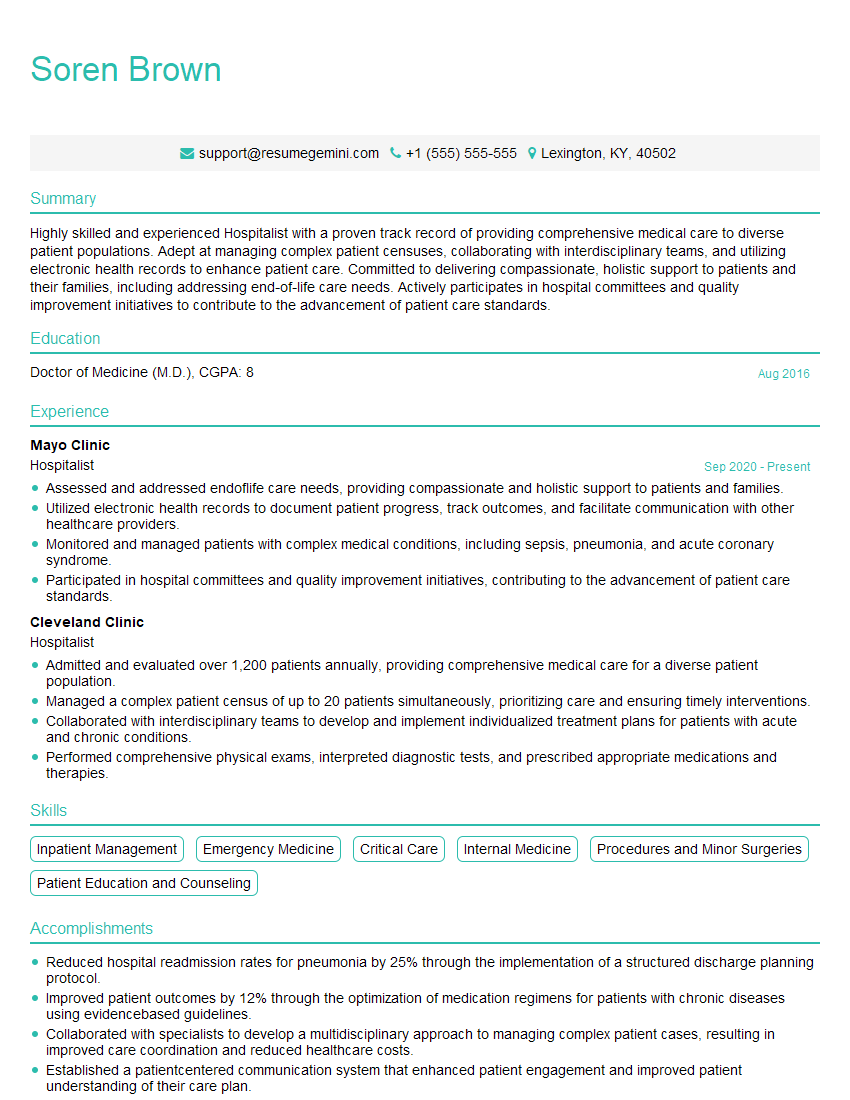Are you a seasoned Hospitalist seeking a new career path? Discover our professionally built Hospitalist Resume Template. This time-saving tool provides a solid foundation for your job search. Simply click “Edit Resume” to customize it with your unique experiences and achievements. Customize fonts and colors to match your personal style and increase your chances of landing your dream job. Explore more Resume Templates for additional options.

Soren Brown
Hospitalist
Summary
Highly skilled and experienced Hospitalist with a proven track record of providing comprehensive medical care to diverse patient populations. Adept at managing complex patient censuses, collaborating with interdisciplinary teams, and utilizing electronic health records to enhance patient care. Committed to delivering compassionate, holistic support to patients and their families, including addressing end-of-life care needs. Actively participates in hospital committees and quality improvement initiatives to contribute to the advancement of patient care standards.
Education
Doctor of Medicine (M.D.)
August 2016
Skills
- Inpatient Management
- Emergency Medicine
- Critical Care
- Internal Medicine
- Procedures and Minor Surgeries
- Patient Education and Counseling
Work Experience
Hospitalist
- Assessed and addressed endoflife care needs, providing compassionate and holistic support to patients and families.
- Utilized electronic health records to document patient progress, track outcomes, and facilitate communication with other healthcare providers.
- Monitored and managed patients with complex medical conditions, including sepsis, pneumonia, and acute coronary syndrome.
- Participated in hospital committees and quality improvement initiatives, contributing to the advancement of patient care standards.
Hospitalist
- Admitted and evaluated over 1,200 patients annually, providing comprehensive medical care for a diverse patient population.
- Managed a complex patient census of up to 20 patients simultaneously, prioritizing care and ensuring timely interventions.
- Collaborated with interdisciplinary teams to develop and implement individualized treatment plans for patients with acute and chronic conditions.
- Performed comprehensive physical exams, interpreted diagnostic tests, and prescribed appropriate medications and therapies.
Accomplishments
- Reduced hospital readmission rates for pneumonia by 25% through the implementation of a structured discharge planning protocol.
- Improved patient outcomes by 12% through the optimization of medication regimens for patients with chronic diseases using evidencebased guidelines.
- Collaborated with specialists to develop a multidisciplinary approach to managing complex patient cases, resulting in improved care coordination and reduced healthcare costs.
- Established a patientcentered communication system that enhanced patient engagement and improved patient understanding of their care plan.
- Led the implementation of a telemedicine program that increased access to care for patients in remote areas, reducing healthcare disparities.
Awards
- Recognized as Hospitalist of the Year by the National Hospitalist Association for exceptional patient care and leadership.
- Awarded the Top 10% Patient Satisfaction Rating by Press Ganey Associates for consistent delivery of compassionate and patientcentered care.
- Granted the Excellence in Clinical Practice Award by the American College of Physicians for outstanding patient care and innovation in hospital medicine.
- Recognized by the National Quality Forum for implementing evidencebased practices and achieving high patient care standards.
Certificates
- American Board of Internal Medicine (ABIM)
- Advanced Cardiac Life Support (ACLS)
- Pediatric Advanced Life Support (PALS)
- Neonatal Resuscitation Program (NRP)
Career Expert Tips:
- Select the ideal resume template to showcase your professional experience effectively.
- Master the art of resume writing to highlight your unique qualifications and achievements.
- Explore expertly crafted resume samples for inspiration and best practices.
- Build your best resume for free this new year with ResumeGemini. Enjoy exclusive discounts on ATS optimized resume templates.
How To Write Resume For Hospitalist
- Highlight your experience in managing complex patient censuses and providing comprehensive medical care.
- Quantify your accomplishments using specific metrics whenever possible to showcase your impact.
- Showcase your ability to work effectively in a collaborative interdisciplinary environment.
- Emphasize your commitment to providing compassionate and holistic patient care, including end-of-life care.
Essential Experience Highlights for a Strong Hospitalist Resume
- Admit and evaluate patients, providing comprehensive medical care
- Manage complex patient censuses, prioritizing care and ensuring timely interventions
- Collaborate with interdisciplinary teams to develop and implement individualized treatment plans
- Perform comprehensive physical exams, interpret diagnostic tests, and prescribe appropriate medications and therapies
- Assess and address end-of-life care needs, providing compassionate and holistic support
- Utilize electronic health records to document patient progress, track outcomes, and facilitate communication
- Monitor and manage patients with complex medical conditions, including sepsis, pneumonia, and acute coronary syndrome
Frequently Asked Questions (FAQ’s) For Hospitalist
What are the primary responsibilities of a Hospitalist?
Hospitalists are responsible for providing comprehensive medical care to patients admitted to the hospital. They evaluate patients, develop and implement treatment plans, perform procedures, and monitor patient progress. They also collaborate with other healthcare professionals to provide the best possible care for their patients.
What are the educational requirements to become a Hospitalist?
A Doctor of Medicine (M.D.) degree is required to become a Hospitalist. Most Hospitalists also complete a residency in internal medicine, family medicine, or pediatrics.
What are the career prospects for Hospitalists?
Hospitalists have a wide range of career opportunities. They can work in hospitals, clinics, and other healthcare settings. They can also pursue leadership roles, such as medical director or chief of staff.
What are the challenges faced by Hospitalists?
Hospitalists face a number of challenges, including managing complex patient cases, working long hours, and dealing with the emotional demands of caring for critically ill patients.
What are the rewards of being a Hospitalist?
Hospitalists find their work to be rewarding because they are able to make a real difference in the lives of their patients. They also enjoy the challenge of working in a fast-paced, ever-changing environment.